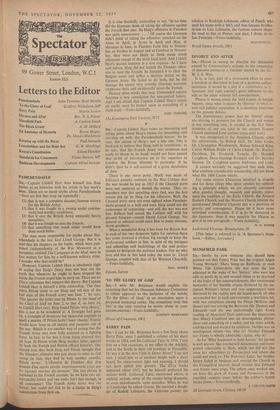Letters to the Editor
Passchendaele `To the Glory of God' Burry Pain Divorce and After Mansfield Park The Block Grant Au Anatomy of Hysteria Keeping up with the Rices Leaseholders and the Rent Act Kenya's Constitution Standards for Consumers Barbican Developments John Terraine, Noel Monks Godfrey Nicholson, MP Martin Seeker Rev. H. S. Power A. Carlton Smith A. M. Millard Bryan Magee. Dr. Murdo Mackenzie Paul Samuels G. W. Hitchings Eileen Fletcher Elaine Burton, MP Captain Alfred htsione PASSCHENDAELE
Sur,-...Captain Liddell Hart does himself less than justice as an historian with his article in last week's issue. There are so many myths about Passchendaele --here are five that crop up repeatedly: (1) that it was a complete disasteqfamous victory for the British Army;
(2) that it was fought in a swamp under continu- ously bad weather conditions; (3) that it cost the British Army unusually heavy casualties; (4) that it was fought to save the French;
(5) that something else much easier would have done much better.
The man most responsible for myths about Pas- schendaele is the late Earl Lloyd George. But it is said that his chapters on the battle, which were pub- lished (independently of the War Memoirs) as a pamphlet, entitled The Campaign in the Mud, were in fact written for him by a well-known military critic. I wonder who that could be?
However, Captain Liddell Hart is absolutely right in saying that Haig's Diary does not bear out the myth that whenever he ought to have stopped the battle the French urged him to carry on. There are no Diary references that support this theory. But Captain Liddell -Hart is himself a little misleading. 'The time when Main came to see Haig and tell him of the bad state of the French army was June 7,' he says. This ignores the letter sent by Main by the hand of his Chief of Staff on June 2, so that if, on June 16, as Liddell Hart says, Haig found Pdtain 'very cheery,' this is not to be wondered at. A fortnight had gone by, a fortnight of desperate but successful attempts to quell a mutiny. If Main hadn't been 'cheery,' France Would have been to all intents and purposes out of the war. Which is not another way of saying that the French Army was now fully restored as a fighting force. In fact, so far was it from being restored that on June 30 Petain wrote Haig another letter, quoted by both the French and British official histories. One should note that both Haig and Main thought that the Flanders offensive was just about to enter its full swing (in fact, they had to wait another month); Pdtain wrote: `L'offensive de Flandres doit etre assurde d'un succes absolu, imperieusement exigt: par les lacteurs moraux du moment.' The last phrase is italicised in the French account. So we have two un- mistakable letters and two visits. Isn't that enough, in all conscience? The French Army never was the factor, but could not fail to be a factor in Haig's calculations from then
It is also decidedly misleading to say, 'At no time did the Germans think of taking the offensive against the French that year. So Haig's offensive in Flanders was quite unnecessary. . . Of course the Germans didn't think of taking the offensive; attacked on the Aisne in April, at Arras in April and May, at Messines in June, in Flanders from July to Novem- ber, at Verdun in August and at Cambrai in Novem ber, they were not likely to think much about offensives except of the most local kind. And Liddell Hart's second sentence is a non sequitur. As I have said before, Haig did not launch the Flanders offen- sive to save the French; he launched it to clear the Belgian coast and inflict a decisive defeat on the German Army. He failed to do both, but he did damage the enemy very severely (German accounts emphasise this), and incidentally saved the French. History often works that way. Unintended success becomes a wry consolation for unexpected failure. And I am afraid that Captain Liddell Hart's attack on myths must be looked upon as something of a myth itself.—Yours faithfully, 33a Kensington Park Gardens, W 11
JOHN TERRAINE










































































 Previous page
Previous page